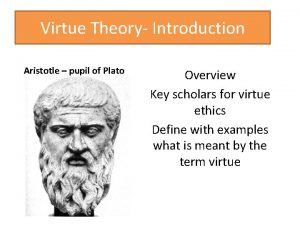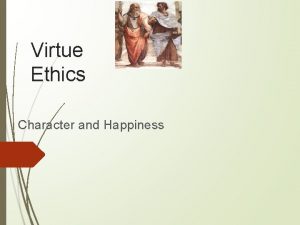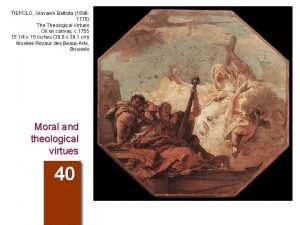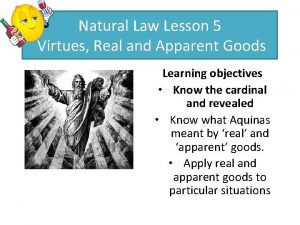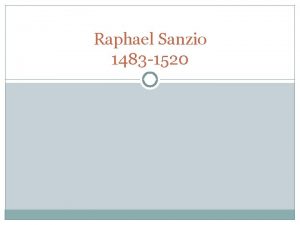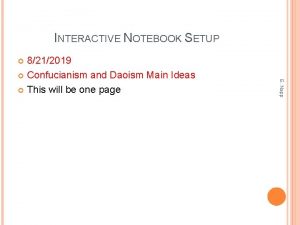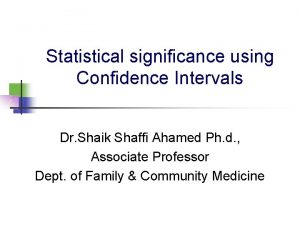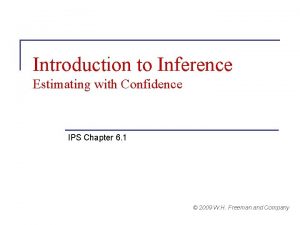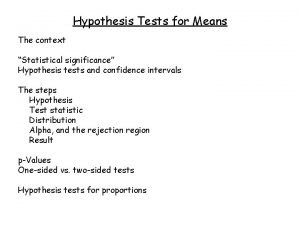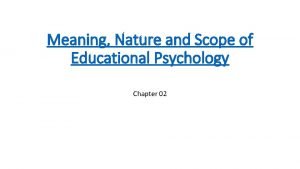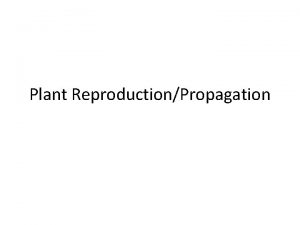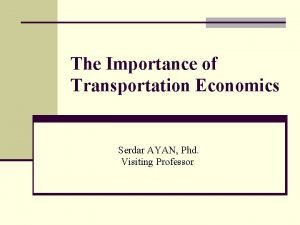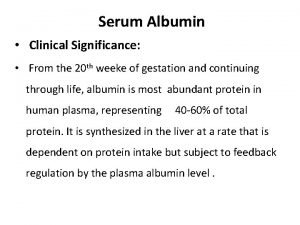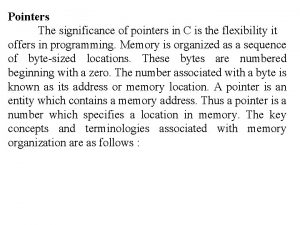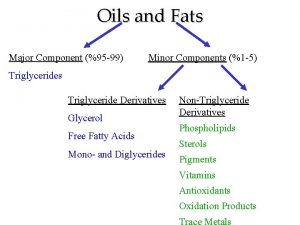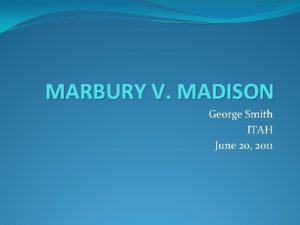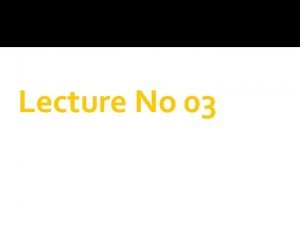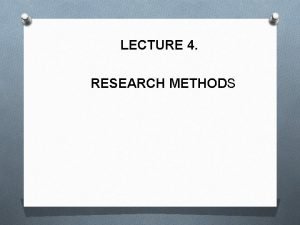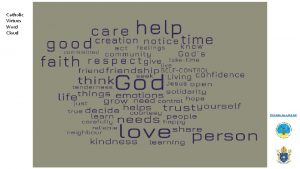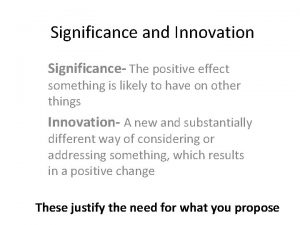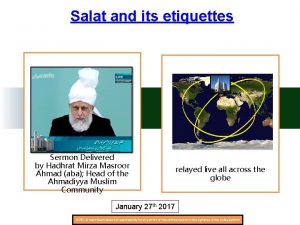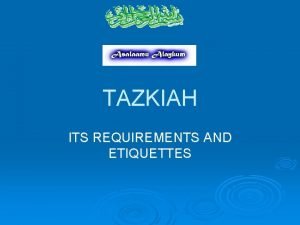Etiquettes and Virtues of Dua Significance of Dua


























































































- Slides: 90

Etiquettes and Virtues of Dua

Significance of Dua • And your Rubb said: `Invoke Me, [i. e. , believe in My Oneness (Islamic Monotheism)] (and ask Me for anything) I will respond to your (invocation). ''' (40: 60) • "Invoke your Rabb with humility and in secret. He likes not the aggressors. '' (7: 55)

Allah is near to respond to Dua • And when My slaves ask you (O Muhammad (PBUH)) concerning Me, then (answer them), I am indeed near (to them by My Knowledge). I respond to the invocations of the supplicant when he calls on Me (without any mediator or intercessor). '' (2: 186)

Allah responds to distress calls • Is not He (better than your gods) Who responds to the distressed one, when he calls on Him, and Who removes the evil? '' (27: 62)

Dua excellent worship


Dua is the worship • An-Numan bin Bashir (RA) reported: The Prophet (SAW) said, . • "Du`a (supplication) is worship. ''[Abu Dawud]. • Dua is an expression of one's humbleness and helplessness before Allah. • This expression before the Infinite Power and Might of Allah is in fact the essence of worshipping Him.

Prophet (SAW) liked comprehensive dua • Aishah (RA) reported: . • • The Messenger of Allah (SAW) liked comprehensive supplications or (Al-Jawami` - i. e. , supplications with very few words but comprehensive in meanings), and discarded others. [Abu Dawud].

A short Dua • A man came to the Prophet (PBUH) and said to him: "O Messenger of Allah! What shall I say if I want to pray to my Rubb? '' He (PBUH) said, "Say: • (O Allah! Forgive me, have mercy on me, guide me and provide me with sustenance). ' Surely, this supplication is better for you in this life and in the Hereafter. '‘ (Muslim, Abu-Dawood)

Seeking good in both worlds • Anas (RA) reported: The supplication most often recited by the Prophet (PBUH) was: . . • [Al-Bukhari and Muslim].

Prophet (SAW) used to ask for 4 virtues • Abdullah bin Mas`ud (RA) reported: The Prophet (PBUH) used to supplicate: • "Allahumma inni as'alukal-huda, wat-tuqa, wal`afafa, wal-ghina (O Allah! I beseech You for guidance, piety, chastity and contentment). ‘’[Muslim].

Explanation of the Hadith • Huda means guidance towards virtue which one needs at every step. The ability to do good and steadfastness on the Right Path is also covered by the term guidance. • Taqwah is to comply with the Orders of Allah and to prevent oneself from what He has forbidden , the importance of which needs no elaboration. • `Affaf is prevention from sins. It also means evasion from seeking help from others. • Ghina means riches which makes one independent of others so much so that all one's hopes are centered on Allah Alone. The prayer quoted in this Hadith is very comprehensive indeed.

Dua for steadfastness on Islam

Explanation of the Hadith • This is a very important Dua because through it one seeks steadfastness in virtue. • Everybody's heart is always open to troubles, turmoil and ordeals and he is drifting from one situation to the other. • If he is not supported by Allah, he can deviate from the Right Path at any moment. • For this reason, he has been required to pray to Allah to save his heart from turning towards evils and keep it towards Allah, because it is He Alone Who is Capable of controlling hearts.

Seeking refuge against 4 evils • Abu Hurairah (May Allah be pleased with him) reported: The Prophet (PBUH) said. • "Seek refuge in Allah against the turmoils, attacks of misfortunes, and evil of judgement and joys of the enemies. '' • [Al-Bukhari and Muslim].

Explanation • Juhd al bala is the trouble of a trial which is unbearable for a person and from which he does not have the power to rid himself • "Ash Shaqa”- - is the opposite of good fortune, that is, to pray for protection from misfortune • Su al Qada- evil of judgment • "Shamatat'' the pleasure that one's enemy feels on one's trouble.

Dua for goodness in this world and the hereafter.

Translation Abu Hurairah (May Allah be pleased with him) reported: The Messenger of Allah (SAW) used to say: • (O Allah, make my religion easy for me by virtue of which my affairs are protected, set right for me my world where my life exists, make good for me my Hereafter which is my resort to which I have to return, and make my life prone to perform all types of good, and make death a comfort for me from every evil). ''[Muslim]. •

Seeking guidance and uprightness • Ali (RA) reported: The Messenger of Allah (SAW) said to me, "Recite: . • (O Allah! Direct me to the Right Path and make me adhere to the Straight Path). '' Another narration is: (I beg You for guidance and uprightness). ''Muslim • "As-Sadad'' means correctness and uprightness. • Some scholars of Hadith have interpreted it as steadfastness and moderation.

Seeking protection against worries • Anas (RA) reported: The Messenger of Allah (SAW) used to supplicate: . • [O Allah! I seek refuge in You from sadness and worries helplessness (to do good), indolence, miserliness cowardice, senility; and from the burden of indebtedness and the tyranny of men). ''[Muslim].

Seeking forgiveness from Allah • Abu Bakr As-Siddiq (RA) reported: I requested the Prophet (SAW) to teach me a dua which I could recite in my Salah. Thereupon he said, "Recite: • (O Allah! I have considerably wronged myself. There is none to forgive the sins but You. So grant me pardon and have mercy on me. You are the Most Forgiving, the Most Compassionate). '''[Al-Bukhari and Muslim].

Seeking forgiveness

Translation • Abu Musa (RA) reported: The Prophet (SAW) used to supplicate: . • (O Allah! Forgive my errors, ignorance and immoderation in my affairs. You are better aware of my faults than myself. O Allah! Forgive my faults which I committed in seriousness or in fun deliberately or inadvertently. O Allah! Grant me pardon for those sins which I committed in the past and I may commit in future, which I committed in privacy or in public and all those sins of which You are better aware than me. You Alone can send whomever You will to Jannah, and You Alone can send whomever You will to Hell-fire and You are Omnipotent). ''[Al-Bukhari and Muslim]. •

Seeking protection against evil of actions • `Aishah ( RA) reported: The Prophet (SAW) used to supplicate : . • (O Allah! I seek refuge in You from the evil of that which I have done and the evil of that which I have not done). ''[Muslim]. • Sometimes a person does a virtuous deed but it is tainted with slight hypocrisy or pride.

Seeking refuge in Allah • `Abdullah bin `Umar (RA) reported: The Messenger of Allah (SAW) used to supplicate thus: . • (O Allah! I seek refuge in You against the declining of Your Favors, passing of safety, the suddenness of Your punishment and all that which displeases You). ''[Muslim].

Seeking forgiveness from Allah •

Translation of Hadith • (O Allah! to You I submit, in You I affirm my faith, in You I repose my trust, to You I turn in repentance and with Your Help I contend my adversaries and from You I seek judgement. O Allah! Grant me forgiveness for the faults which I made in past and those ones I may commit in the future, those which I committed secretly or openly. You Alone send whomever You will to Jannah, and You Alone send whomever You will to Hell-fire. There is none worthy of worship except You)

Seeking refuge in Allah from trials • `Aishah (RA) reported: The Prophet (SAW) used to supplicate: . • (O Allah! I seek refuge in You from the trials and the torment of the Fire and from the evils of wealth and poverty). ''[Abu Dawud and Tirmidhi].

Seeking refuge in Allah from sins • Ziyad bin `Ilaqah reported: My uncle Qutbah bin Malik (RA) said that the Prophet (SAW) used to supplicate: . • (O Allah! I seek refuge in You from undesirable manners, deeds, and aspirations). ''[At-Tirmidhi]. • This dua is recited to seek Allah's Help in shunning bad manners and observing good manners and righteous deeds.

Dua for protection against diseases • Anas (May Allah be pleased with him) reported: The Prophet (SAW) used to supplicate: . • (O Allah! I seek refuge in You from leucoderma, insanity, leprosy and evil diseases). ''[Abu Dawud]. •

Dua to seek protection against hunger • Abu Hurairah (RA) reported: The Messenger of Allah (SAW) used to supplicate: . • [O Allah! I seek refuge in You from hunger; surely, it is the worst companion. And I seek refuge in You from treachery; surely, it is a bad inner trait]. ''[Abu Dawud].

Seeking guidance • `Imran bin Husain (RA) reported: The Prophet (RA) taught my father two statements to recite in his Du`a. These are: . • (O Allah! Inspire in me guidance and deliver me from the evils within myself). ''[At-Tirmidhi]. •

Prophet Dawud’s Dua • Abud-Darda' (May Allah be pleased with him) reported: The Messenger of Allah (PBUH) said, ”One of Prophet Dawud (AS) dua was: • (O Allah! I ask You for Your Love, the love of those who love You, and deeds which will cause me to attain Your Love. O Allah! Make Your Love dearer to me than myself, my family and the cold water). '''[At-Tirmidhi].

Most comprehensive dua • Abu Umamah (RA) reported: The Prophet (SAW) said "Shall I tell you a comprehensive prayer? Say: • (O Allah, I beg to You the good which Your Prophet Mohammad (SAW) begged of You; and I seek refuge in You from the evil where from Your Prophet Mohammad (SAW) sought refuge. You are the One from Whom help is sought and You communicate (the truth). There is no power or strength except with Allah the Exalted, the Great. '''[At-Tirmidhi]

Seeking Allah’s Mercy, Forgiveness • Ibn Mas`ud (RA) reported: One of the supplications of the Messenger of Allah (SAW) was: . (O Allah! I beg You for that which incites Your Mercy and the means of Your forgiveness, safety from every sin, the benefit from every good deed, success in attaining Jannah and deliverance from Fire). ''[Hakim]. •


Translation • Shahr bin Hawshab said: “I said to Umm Salamah (wife of Prophet Muhammad ' : ( ﷺ O Mother of the Believers! What was the supplication that the Messenger of Allah ( ( ﷺ said most frequently when he was with you? ” She said: 'The supplication he said most frequently was: “O Changer of the hearts, make my heart firm upon Your religion • She said: 'So I said: “O Messenger of Allah, why do you supplicate so frequently: 'O Changer of the hearts, make my heart firm upon Your religion. ' • He said: 'O Umm Salamah! Verily, there is no human being except that his heart is between Two Fingers of Allah, so whomsoever He wills He makes steadfast, and whomever He wills He causes to deviate. '” (Tirmithi. Hadith #3522)

Prophet (SAW) dua after persecution at Taif

Dua at taif • To You, my Lord, I complain of my weakness, lack of support and the humiliation I am made to receive. Most Compassionate and Merciful! You are the Lord of the weak, and you are my Lord. To whom do You leave me? To a distant person who receives me with hostility? Or to an enemy You have given power over me? As long as you are not displeased with me, I do not care what I face. I would, however, be much happier with Your mercy. I seek refuge in the light of Your face by which all darkness is dispelled and both this life and the life to come are put in their right course against incurring your wrath or being the subject of your anger. To You I submit, until I earn Your pleasure. Everything is powerless without your support

Etiquettes employed when making Dua • 1 Glorifying and praising Allah (SWT) and praying upon the Prophet Muhammad (SAW) at both the beginning and end: He (SWT) also says, “Their way of request therein will be ‘Glory to You, O Allah!’ And ‘Peace’ will be their greetings therein (Paradise) and the close of their request will be ‘All the praises and thanks are to Allah, the Sustainer of the worlds. ’” (10: 10)

Hadith • The Prophet (SAW) heard a man supplicating during prayer. He did not glorify Allah, nor did he invoke blessings on the Prophet (SAW). • The Prophet (s) said, “He has been hasty. ” • Then he called the man and said either to him, or to someone else, “When any one of you prays, he should begin by glorifying and praising his Lord and then he should invoke blessings on the Prophet, peace be upon him, and after that he should supplicate Allah for anything he wishes. ” (Fiqh-us-Sunnah, volume 4: 111 c)

Essential parts of Dua for its acceptance Whoever obeyed Allah in whatever are His commands and then makes dua from ‘Jahatid Dua’, his dua is accepted. When asked what is ‘Jahatud Dua’? He (SAW) said, “ You begin with praise of Allah (SWT), remember His blessings upon you, then thank Him, then send blessings upon Prophet (SAW), then remember your sins and you acknowledge those, then you seek forgiveness of Allah (SWT) from those (sins). This is the ‘Jahatud Dua’.

2 -Having Wudu •

3 Facing the Qiblah • ‘The Prophet (SAW) left (Madinah) to this prayer, seeking rain. So he made a dua and asked for rain, then he faced the Qiblah and turned his cloak inside out’ (Bukhari, Muslim)

4 Raising both hands: • The Prophet (SAW) said, ‘Indeed Allah SWT is Shy and Beneficent. He is Shy when His servant raises his hands to Him (in dua) to return them empty’ (Ahmad, Abu Dawud, Tirmidhi). Ibn Abbas said: When asking for something you should raise your hands opposite to your shoulders or next to them; when asking forgiveness you should point with one finger; and when making an earnest supplication you should spread out both your hands. ” • “ •

Raising both hands in dua

5 Acknowledging one’s sins and asking forgiveness: • Allah (SWT) says about Dhun Nun (AS), “But He cried through the darkness (saying) ‘none has the right to be worshipped but you (O Allah)’, Glorified (and Exalted) are You! I have been of the wrong doers. ” (21: 87)

Acknowledging one’s sins and asking forgiveness: • Allah (SWT) says about Musa (AS), “He said ‘My Lord! Verily I have wronged myself so forgive me. ’ Then He forgave him. Verily, He is Oft-forgiving, Most Merciful. ” (28: 16)

A good dua would be Sayyidul Istighfar • O Allah, You are my Lord, there is no god but You; You have created me, and I am Your servant, and I stand firm on my covenant with You according to the best of my ability; I seek refuge in You from the evils of my own actions; I acknowledge Your favors upon me and I confess my sins to You; so forgive me, for no one has power to forgive sins except You’.

6 Showing humility, submissiveness, hope and fear: • Allah (SWT) says, “Invoke your Lord with humility and in secret. He likes not the transgressors…And invoke Him with fear and hope, Surely Allah’s Mercy is (ever) near to the good-doers. ” (7: 55, 56) • He (SWT) also says: “O you who have attained to faith! Turn unto God in sincere repentance…” (66: 8)

7 Complaining to Allah (SWT) about all your problems: • Allah (SWT) said about the father of Yusuf (AS), “He said: ‘I only complain of my grief and sorrow to Allah…” (12: 86) • Allah (SWT) says, “And (remember) Nuh, when he cried (to Us) aforetime. We answered his invocation and saved him and his family from the great distress. ” (21: 76)

8 Making dua for oneself first • Allah (SWT) says, “And those who came after them say: “Our Lord! Forgive us and our brethren who preceded us in Faith…” (59: 10) • The dua of Nuh (AS) was, “My Lord Forgive me, and my parents and him who enters my home as a believer and all the believing men and women…” (71: 28) • The narration of Ubay bin Ka’ab (RA) was that if someone was mentioned to the Prophet (SAW), he would pray for him but would begin with himself. • However, it was also narrated that, on certain occasions, he would not begin with himself

9 Keeping your voice between a whisper and speaking aloud: • Allah (SWT) says, “Say (O Muhammad): ‘Invoke Allah, or invoke the Most Gracious, by whichever name you invoke Him (it is the same), for to Him belongs the Best Names. And offer your prayer neither aloud nor in a low voice, but follow a way between” (17: 110)

10 Being determined in one’s request and certain for a response: ﻱ ﺍ ﺍ ﻭ ﺍﻟ ﻯ ﺍﻟ ﺍﻭﺍ ﺍﻟ ﻭﻭ ﺍﺍ ﺍﻭﺍ ﺍﻟ ﺍ ﻳ ﺍ ﺍ ﺍ • ‘When you supplicate to Allah you should be sure of being answered. And know that Allah does not answer a supplication that comes from a careless and inattentive heart’ (Tirmidhi

11 Insistence in dua and repetition (3 times) • The Prophet (SAW) had assures us, ‘The dua of any worshipper will continue to be responded to, as long as he does not ask for a sin or breaking the ties of kinship, and as long as he is not hasty’ (Muslim). The Prophet (SAW) cursed a few members of the Quraysh thrice when they placed the abdominal contents of a camel on his back whilst in sajdah (prostration) “Abdallah bin Mas’ud(RA) reported that the Prophet (SAW) loved to repeat his supplication three times, and pray forgiveness three times. ” (Abu Daw’ud)

12 Avoid using rhymed prose and not letting it affect one’s dua • Ibn 'Abbas said, “……. . And avoid the use of rhymed prose in invocation for I noticed that Allah's Prophet (SAW) and his companions always avoided it. ” (Bukhari) However, the Prophet (SAW) on occasions used rhymed prose in dua, such as “I seek refuge in You from eyes that do not shed tears and a soul that is not satisfied and from a heart that does not show humility. ”

13 Making dua to Allah (SWT) by His Beautiful Names (Amaa’ al Husna): • Allah (SWT) says, “And to Allah belong the beautiful names, so invoke Him by them” (7: 180).

14 Making dua for everything and in times of distress and pleasure: • • Allah SWT says, “When We bestow Our favor upon man, he avoids (to appreciate it) and keeps himself far aside (from obedience), and when some evil touches him, he is full of lengthy prayers. ” (41: 51) The Prophet (SAW) said, “(Anyone who is pleased) that Allah responds to him at the time of trouble and distress, (should) increase Dua at the time of calmness. ” (Tirmithi)

15 Best Times to make dua a). THE LAST THIRD OF THE NIGHT • The Prophet (SAW) said: "When it is the last third of the night, our Allah (SWT), descends every night to the heaven of the world and says, 'Is there anyone who invokes Me (ask anything from Me), that I may respond to his invocation; Is there anyone who asks Me for something that I may give (it to) him; Is there anyone who asks My forgiveness that I may forgive him? ” (Bukhari, Volume 8, Book 75, Number 333)

Dua at Tahajjud

b. AN HOUR ON FRIDAY • The Prophet (SAW) said, "On Friday there is a particular time. If a Muslim happens to be praying and invoking Allah for something good during that time, Allah will surely fulfill his request. " • The Prophet (SAW) pointed out with his hand. We thought that he wanted to illustrate how short that time was. (Bukhari, Volume 8, Book 75, Number 409) • The Prophet (SAW) said: “Seek the time in which hope is placed on Friday from after the afternoon prayer till sunset. " (Al-Tirmidhi Hadith 1360)

Best times to make dua • c. THE NIGHT OF 'QADR' (DECREE) This night in Ramadan is the greatest night of the year. The Almighty Allah (SWT) said about it, "The night of Al-Qadar (Decree) is better than a thousand months. " (Qur’aan 97: 3) • d. THE DUA OF A MUSLIM FOR HIS MUSLIM BROTHER OR SISTER The Prophet (SAW) said “He who supplicates for his brother behind his back (in his absence), the Angel commissioned (for carrying dua to his Lord) says: Ameen, and it is for you also”. (Muslim, Book 035, Number 65)

Best times to make dua • e. DUA DURING THE MONTH OF RAMADAN The Prophet (SAW) said, “When the month of Ramadan comes, the gates of mercy are opened, and gates of Hell are locked and devils are chained”. (Muslim Book 6, No. 2361) • f. A TRAVELLER’S AND A PARENT’S DUA The Prophet (SAW) said, three duas are answered, there being no doubt about them; that of a father, that of a traveller and that of one who has been wronged. (Abu Dawud Book 8, Number 1531) GLO

Best times to make dua • g-At the time of the Adhan. • h-Between the Adhan and iqama. • i-At the ends of the prescribed prayers. • j-From the time the Imam ascends the pulpit to the time the prayer has finished on the day of Jumu`ah. • k-The last hour after the prayer Asr.

16 Ending the dua with Aameen: • We went out with the Prophet of Allah (SAW) one night and came upon a man who made supplication with persistence. The Prophet (SAW) waited to hear him. The Prophet (SAW) said: “He will have done something which guarantees (Paradise for him) if he puts a seal to it. ” • One of the people asked: “What should he use as a seal? ” • He replied: “Aameen, for if he ends it with Aameen, he will do something which guarantees (Paradise for him). ”Narrated by Abu. Zuhayr an-Numayri in Sunan Abu Dawood

Reasons why dua may not be answered • 1 Dua without praising Allah and without sending blessings upon the Prophet • “And (all) the Most Beautiful Names belong to Allah, so call on Him by them” [al A’raaf 7: 180]. • "ﺇﻥ ﺍﻟﺪﻋﺎﺀ ﻣﻮﻗﻮﻑ ﺑﻴﻦ ﺍﻟﺴﻤﺎﺀ ﻭﺍﻷﺮﺽ ﻻ ﻳﺼﻌﺪ ﻣﻨﻪ ﺷﻴﺀ ﺣﺘﻰ ﺗﺼﻠﻲ ﻋﻠﻰ ﻧﺒﻴﻚ ﺻﻠﻰ ﺍﻟﻠﻪ ﻋﻠﻴﻪ ﻭﺳﻠﻢ Umar (RA) said: “Du’a’ is detained (stopped) between the heavens and the earth and no part of it is taken up until you send blessings upon your Prophet (SAW). ” [Ref: Narrated by al Tirmidh

2. Failing to Remember Allah (SWT) at times of Happiness • Narrated Abu Hurairah (RA): Allah’s Messenger ﺻﻠﻰ ﺍﻟﻠﻪ ﻋﻠﻴﻪ ﻭﺳﻠﻢ said: • “Whoever would be pleased to have Allah respond to him during hardship and disaster should make much Du`a’ in times of ease. ” • [Tirmidhee (3383) and graded as “Hasan” by Shaikh al Albaanee] •

3. Failing to pray for oneself first • Narrated Abi bin Ka`b (RA): • Allah’s Messenger ﺻﻠﻰ ﺍﻟﻠﻪ ﻋﻠﻴﻪ ﻭﺳﻠﻢ directed that when supplicating for another, one should begin with himself. [Tirmidhee 3384) • It is appropriate for a person when he is supplicating to start with himself first : • Musa a. s said: {My Lord Forgive me and my brother} • Nuh a. s said {Our Lord forgive me and my parents} He preceded himself before his parents

4. Failing to supplicate at the times when prayers are answered the most • There are certain times/moments when it is reported that our prayers are quickly accepted or answered. • We must take advantage of these jackpots (times) Allah gave us.

5. Complaining to others and not seeking Allah's help for our problems • The Prophet of Allah, Yaqoob , ﻋﻠﻴﻪ ﺍﻟﺴﻼﻡ said: • I only complain of my grief and sorrow to Allah. . . [Surah Yusuf (12): 86]

6. Supplicating to those who have left this world {Verily, you cannot make the dead to hear. . . } [Surah al-Naml (27): 80] Say: “Who can protect you from Allaah if He intends to harm you or who can prevent Him if He intends to show you mercy? ” They will find none besides Allaah to protect or help them. } [Surah al-Ahzaab (33): 17]

7. Disobeying Allah indulging in Evil and not Enjoining Good • Narrated Hudhaifah(RA): The Prophet ﺻﻠﻰ ﺍﻟﻠﻪ ﻋﻠﻴﻪ ﻭﺳﻠﻢ said: “By Him in Whose hand my soul is, you must enjoin what is reputable and forbid what is disreputable, or Allah will certainly soon send punishment from Himself to you. Then you will make supplication and not receive an answer. ” Tirmidhee (2169) • The Messenger of Allah (SAW) said, “Command the good and forbid the evil before you supplicate so that it is answered. ” (Ibn Maajah)

8. Lending money without any contract • Prophet (SAW) said: “There are three who call upon Allah but their prayer will not be answered… (cont. . ). . . and a man who lent money to another man but he did not have (the loan) witnessed. ” (Saheeh al Jaami’, 3075) • The above command of Prophet (SAW) could be because of the following: • “You should not become weary (lazy, ignorant) to write it (your contract), whether it be small or big, for its fixed term” [al Baqarah 2: 282)

9. Drinking or consuming any form of intoxicant • ‘Abdallah ibn ‘Amr (RA) reported : The Messenger of Allah (SAW) said: • “Whoever drinks alcohol and gets drunk, his prayer will not be accepted forty days and if he dies he will go to Hell. But if he repents, Allah will accept his repentance. • If he commits (this sin) again, then Allaah pledges to make him drink the mud of khabaal on the Day of Resurrection. ” They asked, “O Messenger of Allah, what is the mud of khabaal? ” He said, “The drains of the people of Hell. ” [Ibn Maajah (3377

10. Wearing a Taweedh (amulet) for protection or seeking help • It was narrated that ‘Uqbah ibn ‘Aamir (RA)said: I heard the Messenger of Allah (SAW) say: • “Whoever wears an amulet (taweedh), may Allah not fulfil his need , and whoever wears a sea shell, may Allah not give him peace. ” • [Ref: Narrated by Ahmad, 16951]

11. Going to a Fortune Teller • Prophet (s. a. w) said • “Whoever goes to a fortune teller and asks him about something, his prayers will not be accepted forty nights” [Ref: Saheeh Muslim, 4/1751]

12. Being Impatient getting frustrated • Imam Sufyan ibn `Uyaynah: • “Don’t ever leave off making Du’a nor allow what [bad deeds] you commit to prevent you from it, for indeed Allah answered the Du’a of Iblees (the Devil) and he is the most evil of creation • Narrated Abu Hurairah: The Prophet ﺻﻠﻰ ﺍﻟﻠﻪ ﻋﻠﻴﻪ ﻭﺳﻠﻢ said, “The invocation of anyone of you is granted (by Allah) if he does not show impatience (by saying, “I invoked Allah but my request has not been granted). ”

13. Asking to break family ties • Abu Sa’eed (RA) said that the Prophet (SAW) said: • “There is no Muslim who does not offer any du’a in which there is no sin or severing of family ties but Allah will give him one of three things in return: 1. He will answer his du’a’ sooner, or 2. He will store it up for him in the Hereafter 3. He will divert an equivalent evil away from him because of it. ” • They said: “we will say a lot of du’a’. ” He said: “Allah is more generous. ” [Narrated by Ahmad (10749),

14. Being uncertain while Making Dua • Abu Huraira (RA) that the Messenger of Allah (SAW) said, ”When you are making dua, do not say: ‘O Allah, forgive me if You wish. O Allah, forgive me if you wish. ’ You should be firm in your asking, for there is no compelling Him. ” • [ Al Muwatta hadith 28, volume 15) • One should always believe that Allah is listening and he will either answer your prayer, or expiate some sins in exchange for it or give you the reward in the hereafter because

15. Eating, Drinking & living on Haraam • Abu Hurairah (r. a) reported that the Prophet (s. a. w) said, “O people, Allah is Good and He, therefore, accepts only that which is good. And Allah commanded the believers as He commanded the Messengers by saying: • "O Messengers, eat of the good things, and do good deeds; verily I am aware of what you do, " ( Qur’an 23. 51) • "O those who believe, eat of the good things that We gave you’. ” (Qur’an 2. 172)

Continuation of Hadith • The Prophet (SAW) then made mention of a person who travels widely, his hair disheveled, and covered with dust. “He lifts his hands and makes supplication, ‘O Lord, ’ but his diet (food) is unlawful (haram), his drink is unlawful, and his clothes are unlawful, and his nourishment (survival) is unlawful. How then can his supplication be accepted? “ [Muslim. Ahmad]

16. Making Dua with a distracted mind, or carelessly • One should be focused while making dua for he is invoking the Lord of the Universe, the sustainer, the creator, the merciful , the compassionate !! ﻱ ﺍ ﺍ ﻭ ﺍﻟ ﻯ ﺍﻟ ﺍﻭﺍ ﺍﻟ ﻭﻭ ﺍﺍ ﺍﻭﺍ ﺍﻟ ﺍ ﻳ ﺍ ﺍ ﺍ • Abu Huraira reported: The Messenger of Allah (SAW) said, “Call upon Allah with certainty that he will answer you. Know that Allah will not answer the supplication of a heart that is heedless and careless. ”[Ref: Sunan At. Tirmidhi 3479

17. Making Unnecessary Dua or Overstepping while Making Dua • Reported from Abdallah ibn Mughaffal (R. A) that he heard his son say: • “O Allah, I ask You for the white palace on the right side of Paradise if I enter it. ” He said: “O my son, ask Allah for Paradise and seek refuge with Allah from the Fire. • I heard the Messenger of Allah (SAW) say: ‘Among this Ummah will be people who overstep the mark in purifying themselves and in making Dua” [Narrated by Abu Dawood, 690]

18. Showing improper manners while making Dua • • • Invoke your Lord with humility and in secret. He likes not the aggressors” [al-A’raaf 7: 55]. One should realize that one is begging from the Lord of the universe. Showing respect, humility and sincerity is a must while making dua. Proper pronunciation of the words in Arabic taken from the Qur'an and Sunnah are very important while invoking Allah Mistakes in pronunciation can change the meanings “ .

20. Indulging in bid'ah (innovation) • The Messenger of Allah (SAW) said : ﺇﻥ ﺍﻟﻠﻪ ﺍﺣﺘﺠﺰ ﺍﻟﺘﻮﺑﺔ ﻋﻦ ﺻﺎﺣﺐ ﻛﻞ ﺑﺪﻋﺔ Indeed Allah does not accept the repentance of an innovator until he stops the innovation. (Tabarani in al-Awsat) • The Messenger of Allah (SAW) said: "Every innovation is misguidance and going astray" Reported by Abu Daawood (no. 4607

10 Reasons for not acceptance of Dua by Ibrâhîm b. Adham (d 162 H) 1. You know Allah but you do not give Him His rights; 2. You have read Allah's Book but you do not act by it; 3. You claim to love Allah's Messenger (SAW) yet you abandon his Sunnah 4. You claim to be enemies to Shaytân but you follow him 5. You say you love Par adise yet you do not work for it;

10 Reasons for not acceptance of Dua 6 You say you fear The Fire yet you get closer to it [by sinning]; 7 You say death is true but you do not prepare for it; 8 You busy yourselves with the faults of others and disregard yours 9 You consume the favors of your Lord but are not grateful 10 You bury your dead but take no lesson from them. ” [Ref: Abû Nu’aym, Hilyah Al-Awliyâ’ 8: 15, 16. ]



 Theological and cardinal virtues
Theological and cardinal virtues Three letters and six etiquettes
Three letters and six etiquettes Office etiquette definition
Office etiquette definition What is internet etiquettes
What is internet etiquettes What kind of etiquettes are proof reading
What kind of etiquettes are proof reading Taif dua
Taif dua What does moral reasoning mean
What does moral reasoning mean Seven deadly sins and seven heavenly virtues
Seven deadly sins and seven heavenly virtues Virtues and vices are attitudes. what are their objects?
Virtues and vices are attitudes. what are their objects? Pupil
Pupil Virtues list
Virtues list Rosalind hursthouse
Rosalind hursthouse What were aristotle's virtues
What were aristotle's virtues All virtues
All virtues Ccc virtues
Ccc virtues Virtue ethics
Virtue ethics Capital virtue
Capital virtue Opposite virtues
Opposite virtues Apparent good examples
Apparent good examples Ethics triangle
Ethics triangle What were aristotle's virtues
What were aristotle's virtues Aristotles virtues
Aristotles virtues Four cardinal virtues
Four cardinal virtues Virtues of hajj
Virtues of hajj Infused virtues
Infused virtues The twelve virtues
The twelve virtues God-given virtues that direct us to our loving, triune god.
God-given virtues that direct us to our loving, triune god. Justice and virtue
Justice and virtue The virtues of growing older
The virtues of growing older 4 cardinal virtues
4 cardinal virtues Natural law ethics
Natural law ethics Basics of daoism
Basics of daoism Significance level vs confidence level
Significance level vs confidence level Significant of the study example
Significant of the study example Confidence level and significance level
Confidence level and significance level Confidence level and significance level
Confidence level and significance level Background significance
Background significance Once more
Once more What does the title painted faces and long hair mean
What does the title painted faces and long hair mean Learning objectives of reproduction in plants
Learning objectives of reproduction in plants Marbury vs madison significance apush
Marbury vs madison significance apush Criteria for historical significance
Criteria for historical significance Clinical significance of uric acid
Clinical significance of uric acid Marshall case
Marshall case Truman doctrine key points
Truman doctrine key points Plessy v ferguson summary
Plessy v ferguson summary What is the significance of the northwest ordinance? *
What is the significance of the northwest ordinance? * You've always been a tourist here kite runner
You've always been a tourist here kite runner Importance of transportation
Importance of transportation Summary of the fur coat by sean o'faolain
Summary of the fur coat by sean o'faolain Significance of reynolds number
Significance of reynolds number Surrender at appomattox court house significance
Surrender at appomattox court house significance Sherman's march significance
Sherman's march significance Significance test
Significance test Test of significance
Test of significance Practical significance example
Practical significance example Practically significant
Practically significant Generating alpha meaning
Generating alpha meaning Fpp26
Fpp26 Significance of numbers in islam
Significance of numbers in islam What is the significance of a chemical formula
What is the significance of a chemical formula Clinical significance of albumin
Clinical significance of albumin What is a significance test
What is a significance test Management of learning mol
Management of learning mol Research methodology lecture
Research methodology lecture Needs for project formulation
Needs for project formulation 4. what is the significance of mr. gatz’s arrival?
4. what is the significance of mr. gatz’s arrival? Form factor formula
Form factor formula Fovea palatinae
Fovea palatinae Exmple
Exmple Saponification unit
Saponification unit Difference between phosphorus cycle and carbon cycle
Difference between phosphorus cycle and carbon cycle Non dimensional numbers
Non dimensional numbers Introduction of holy panchayat
Introduction of holy panchayat Ghosts by ibsen summary
Ghosts by ibsen summary Margaret atwood surfacing
Margaret atwood surfacing Marbury v madison significance
Marbury v madison significance Long term manpower planning
Long term manpower planning Define managerial economic
Define managerial economic Significance of ideology
Significance of ideology Significance of the study sample
Significance of the study sample Weber number significance
Weber number significance Maximin and minimax principle
Maximin and minimax principle Practical significance
Practical significance Significance of hmp shunt in biochemistry
Significance of hmp shunt in biochemistry Oh babylon oh babylon we bid thee farewell
Oh babylon oh babylon we bid thee farewell Main function of tca cycle
Main function of tca cycle Achlorophylous
Achlorophylous Napoleonic code significance
Napoleonic code significance Significance of food chain
Significance of food chain Mcculloch v maryland significance
Mcculloch v maryland significance









